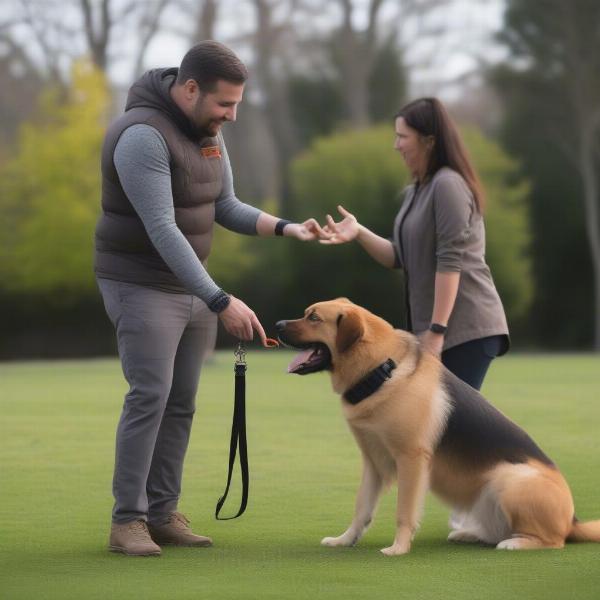Big dog bark collars can be a helpful tool for managing excessive barking, but it’s essential to choose and use them responsibly. This guide will cover everything you need to know about bark collars for larger breeds, from understanding the different types to ensuring proper fit and training techniques. We’ll delve into the pros and cons, helping you make an informed decision about whether a bark collar is right for your furry friend.
Types of Bark Collars for Big Dogs
There are several types of bark collars available, each working on different principles:
- Citronella Spray Collars: These collars release a burst of citronella spray when the dog barks. The scent is unpleasant to dogs, interrupting the barking behavior.
- Ultrasonic Bark Collars: These emit a high-pitched sound that only dogs can hear when they bark. Like the citronella spray, the sound is designed to deter barking.
- Vibration Bark Collars: These collars deliver a vibrating pulse when the dog barks. The sensation is meant to distract and deter the barking.
- Static Shock Collars (e-collars): These collars deliver a mild static correction when the dog barks. These are often considered a last resort and should only be used under the guidance of a certified professional dog trainer.
Choosing the Right Bark Collar for Your Big Dog
Selecting the right bark collar for your large breed dog involves considering several factors:
- Size and Breed: Ensure the collar fits your dog’s neck comfortably and securely. A collar that’s too tight can be uncomfortable, and one that’s too loose may be ineffective.
- Temperament: A sensitive dog may respond well to a vibration collar, while a more stubborn barker might require a different approach.
- Barking Trigger: Understanding why your dog barks is crucial. Is it due to anxiety, boredom, territoriality, or something else? Addressing the underlying cause of the barking is essential for long-term success.
Using Bark Collars Effectively and Humanely
Bark collars should never be used as a quick fix. They are most effective when used as part of a comprehensive training program.
- Positive Reinforcement: Reward your dog for quiet behavior with praise, treats, or toys.
- Consistency: Use the collar consistently every time your dog barks excessively.
- Supervision: Monitor your dog closely when using a bark collar, especially initially.
- Professional Guidance: Consult with a certified professional dog trainer for personalized guidance and support. They can help you choose the right collar and develop a training plan.
 Using a Bark Collar Humanely and Effectively
Using a Bark Collar Humanely and Effectively
Are Bark Collars Cruel?
“Bark collars can be a helpful tool when used responsibly,” says certified dog trainer, Sarah Miller. “It’s important to prioritize positive reinforcement methods and address the underlying reasons for barking.” Proper fit and consistent training are key to ensuring humane and effective use.
Do Bark Collars Work on All Big Dogs?
“While bark collars can be effective for many dogs, it’s important to remember that every dog is an individual,” says Dr. Emily Carter, a veterinarian specializing in canine behavior. “Some dogs may not respond to bark collars, and it’s crucial to explore other training methods if necessary.”
Conclusion
Big dog bark collars can be a valuable tool for managing excessive barking, but responsible use is paramount. By understanding the different types, choosing the right collar for your dog, and implementing it as part of a comprehensive training program, you can help your furry friend learn to bark appropriately. Remember to consult with a professional for personalized advice and support.
FAQ
- How do I choose the right size bark collar for my big dog? Measure your dog’s neck circumference and refer to the manufacturer’s sizing chart.
- Are bark collars safe for my big dog? When used correctly and humanely, bark collars are generally safe. Always follow the manufacturer’s instructions and consult with a professional if needed.
- Can I leave a bark collar on my dog all the time? No, bark collars should not be worn for extended periods. Follow the manufacturer’s recommendations for usage time.
- What if my dog’s barking doesn’t stop with a bark collar? Consult a certified dog trainer or veterinarian to explore other training methods or address any underlying medical conditions.
- Are there any alternatives to bark collars for big dogs? Yes, training methods like positive reinforcement, desensitization, and counter-conditioning can be effective alternatives.
- Can a bark collar hurt my dog? When used correctly, most bark collars should not cause pain. However, misuse can lead to discomfort or injury.
- How do I introduce a bark collar to my big dog? Introduce the collar gradually and pair it with positive reinforcement.
ILM Dog is your trusted source for expert dog care advice. We offer valuable insights on various aspects of dog ownership, from breed selection to health, training, nutrition, and grooming. Whether you’re a seasoned dog owner or just starting your journey, ILM Dog provides practical, reliable information to help you provide the best possible care for your furry friend. Contact us today for personalized advice! Email: [email protected], Phone: +44 20-3965-8624. Visit us at ILM Dog for more helpful resources.